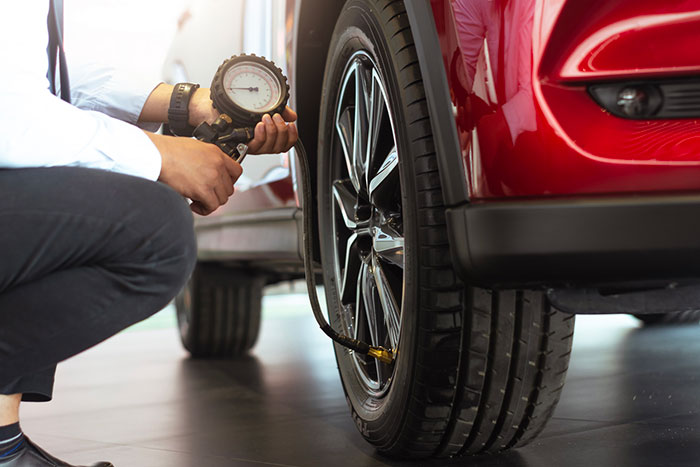
Did you know, the outside climate can have a significant impact on your tyre pressure? Fluctuating temperatures and weather conditions can have a direct effect on the amount of air in your tyres. How? In warm weather, hot air expands and causes the air pressure to increase, while in cold weather, cold air contracts and causes the pressure to decrease. This can cause problems for drivers if they don’t check their tyre pressure regularly. Fortunately, it’s easy to avoid flat tyres or other issues that might result from changes in tyre pressure. Read on to find out more.
Why is Tyre Pressure Important?
For maximum safety and performance, car tyres require a specific pressure depending on the vehicle dimensions, estimated in pounds per square inch (PSI). Low pressure (underinflated tyres) can result in poor vehicle handling, irregular tyre wear and the potential for a flat tyre. Pressure that’s too high (overinflated tyres) can impact handling, braking, and comfort, and cause uneven tyre wear.
The Impact of Cold Weather on Tyre Pressure
When it’s cold outside, the air particles in your tyres contract, which can cause your tyre pressure to drop. For every 10-degree drop in air temperature, your tyre pressure can decrease by 1-2 PSI. Simply driving the vehicle can assist the tyres with warming up, and this often leads to the air pressure returning to normal. In excessively cold temperatures or long spells of cold weather, it is essential to keep an eye on your tyre pressure and perform manual checks only a monthly basis, and add air as needed to maintain the recommended pressure.
The Impact of Hot Weather on Tyre Pressure
In excessively hot weather, the air inside your tyres expands, which can cause your tyre pressure to increase. For every 10-degree increase in temperature, your tyre pressure can increase by 1-2 PSI.
During summer, it’s important to monitor your tyre pressure release air if needed to ensure the recommended pressure is always maintained.
What About Humidity?
Humid weather can also affect tyre pressure, as moisture in the air can enter your tyres and cause the pressure to increase. Whilst this effect is generally small, it’s still a good idea to check your air pressure in long bouts of humid weather or if you live in a tropical area.
Proper air pressure is important for safety, performance, and the longevity of your tyres. It’s a good idea to check your tyre pressure regularly, especially during extreme weather conditions so that you can be sure of a safe and comfortable ride.
If you want to ensure that your air pressure is always at the right level, a tyre pressure monitoring system (TPMS) from Safe T Tyre is the best solution. Our TPMS is a cost-effective and easy-to-install addition that will help to keep your car safer, optimise performance, and ensure you get the most out of your tyres.
Reach out to our team online now or by calling 1800 499 383. As an Australian owned, trusted supplier of high-quality tyre pressure monitoring systems, your safety is our priority. Purchase a TPMS today.

